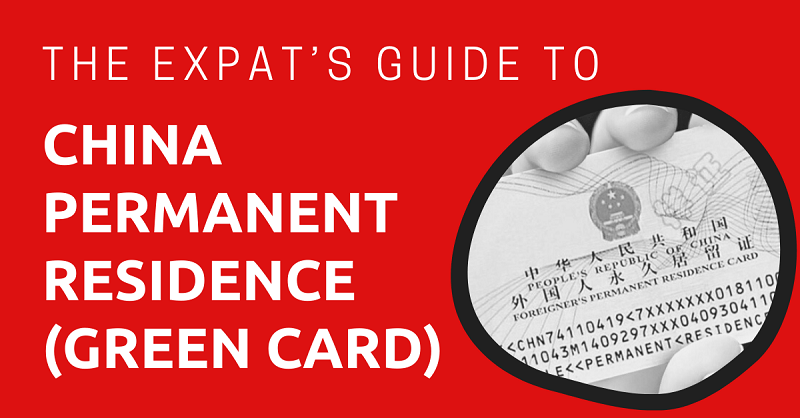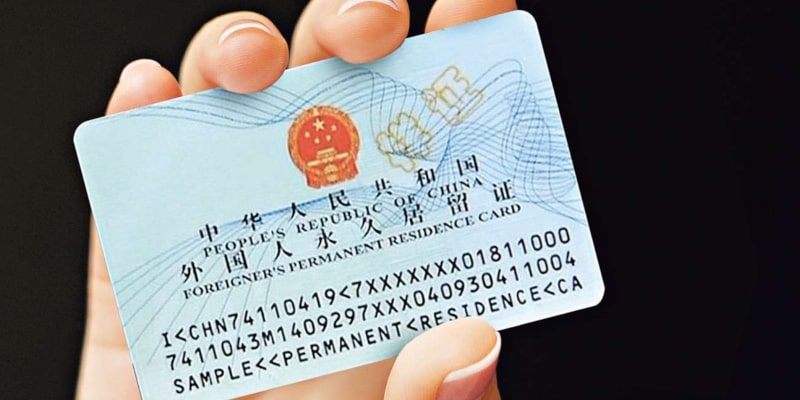
There is a way for people to live in China long-term without dealing with yearly visa bureaucracy (for ten years at least). You’ll need to be serious about staying in China, and meet some stringent criteria. But if you do, you gain many other benefits that could transform your expat experience. It’s officially called Permanent Resident Status, but is popularly known as the “Chinese Green Card.”
As the name suggests, The Chinese permanent residence certificate is an actual card, which you can use when traveling just like a Chinese ID. The card is sometimes known as the Chinese “green card”, although in fact it’s mostly blue. The term comes from the US equivalent.
It is possible to apply for the green card from abroad, you will need to be granted a D visa on which you can enter the country, then convert it to an ID card. However, since one of the main criteria is long-term residence in China, you are more likely to be applying internally.
This article will take approximately 13 minutes to read. Don't have the time right now? No worries. You can email the ad-free version of the article to yourself and read it later!
Disclaimer: This article may include links to products or services offered by ExpatDen’s partners, which give us commissions when you click on them. Although this may influence how they appear in the text, we only recommend solutions that we would use in your situation. Read more in our Advertising Disclosure.
Contents
Benefits
There are many benefits to having a Chinese Green Card, but that does not mean it is the right choice for every expat.

Below are some of the pros and also some drawbacks to achieving permanent residence status in China.
- You can come and go freely without the need for a visa
- Your relatives can apply for a Q visa to visit you
- Your spouse and dependents can also apply for permanent residence more easily
- You do not need a work permit to work in China
- You can apply for professional qualifications in China
- You can set up a foreign-invested enterprise (FIE), and take advantage of simplified procedures when applying for government approval of your project
- Your children can be educated for free in Chinese state schools
- You can contribute to – and benefit from – social insurance, with simplified procedures for transfer when changing jobs
- You can purchase a home in China more easily
- You can participate in housing provident funds, schemes from which the government makes low-cost mortgage loans
- You have the same rights as a Chinese citizen when it comes to banking, insurance, securities, futures, and other financial services
- Money earned in China can be sent overseas, provided you have the proper certificate from the tax authorities
- You can also use the card as Chinese citizens use their ID card, e.g. when booking flights or railway tickets
- You are treated the same as a Chinese citizen at tourist venues, and pay the local price when it’s cheaper than for foreigners
Despite all these benefits, the Permanent Residence card does not confer citizenship, so you will not have the rights or responsibilities of a Chinese citizen: you will not be allowed to vote, run for election, or serve in the armed forces.
It is theoretically possible to apply for citizenship. Under the Nationality Law, you can apply to become naturalized if you have relatives who are resident Chinese citizens, if you have settled in China, or “have other legitimate reasons.”
In practice however, citizenship is hardly ever granted. Since the founding of the PRC in 1949, only a few hundred foreigners in exceptional circumstances have been naturalized. For most expats, however committed you are to building a life in China, the Green Card is as close to becoming Chinese as you can get.
Requirements
“Green cards” are notoriously difficult to get, though the rules were eased slightly in 2020.
It is only after you have achieved one of the requirements below and lived in China successfully for a certain amount of time that you might be ready to apply for permanent residency.
If you are trying to become an expat for the first time and have no China experience, the Chinese Green Card is most likely not a viable option for you.
The basic requirements are that you are in good health and have no criminal record. You then need to meet one of the following five criteria:
International Talent or Recognized Achievement
This category is for people “recommended by the government” or who “make an outstanding contribution”. Applicants need to be “high-level foreign talents” or “foreigners who make major
and outstanding contributions, or are badly needed by China.”
The main purpose of this category is to attract outstanding individuals from the Chinese diaspora, but it’s also used to award permanent residence to celebrities such as basketball player Stephon Marbury, who had spent five years in China and won three CBA championships with the Beijing Ducks.
While you may be an exceptional talent in your own sphere, most expats have little chance of meeting this criterion.
Employment and Education
This will be the easiest way for most expats to demonstrate their commitment to living and working in China.
Coming to China to work involves a series of steps which are unavoidable if you plan to live in China long-term:
- First you need to achieve employment with a legitimate employer
- With your employer’s support, you need to apply for a visa to enter China. Your visa type will depend on your job
- On arrival, you need to have a physical examination at a designated hospital
- You will apply for a residence permit to replace your visa and work permit (a separate book)
Then, there are a number of different routes to qualification:
Being a “Talent”
This is different to being a “high-level talent,” and is more achievable. You might qualify if you are working in a key position in an innovative company, and have skills which are in shortage in China, particularly tech skills. You need to have worked in China for a minimum of three years.
Being in an “Essential Position”
This typically means holding an executive position in a Chinese company, or being an associate professor, associate researcher, or above at an educational institution. To qualify you need to have spent at least three years out of the last four in China.
Being “Recognized by the Market”
This qualification depends on your earnings, taxes paid, and of course length of residence. To count as “resident” in any given year, you need to have spent at least six months of that year in China. If you have four years residence on that basis, then you need to have earned an annual salary at least six times the average wage of urban working employees in the city or town where you were living in that, and paid individual income tax no less than 10 percent of your annual income.
Education
You need to hold a doctorate-level qualification and have lived and paid taxes for three years in China. Some government sites add that you also have to be “Chinese with a foreign passport.” It’s not clear how they assess Chinese-ness if not by nationality, and whether this is official policy or one official’s interpretation.
Foreign Investors
Another way to have demonstrated your commitment to China is to have invested your own money there. The sums required are considerable though: you need to have invested at least USD 500,000 in the poorer western areas of China, USD 1 million in central China, or USD 2 million in the richer coastal areas, all over three years.
You also need to show you have paid your taxes.
Accompanying Family Members
Spouses and dependent children of anyone entitled to apply in the first three categories can also apply, at the same time or subsequently.
Family Reunion
Unmarried children aged under 18 can gain permanent residence if one or more of their parents is a Chinese citizen or a foreigner with permanent residence. Similarly, people aged over 60 with no immediate family abroad, who are dependent on immediate family in China, and who have lived in China for at least nine months out of each of the last five years, are entitled to apply.

Perhaps more usefully for most expats, if you have been married for at least five years to a Chinese citizen or a foreigner with permanent residence, and you’ve lived in China for nine months out of each of the last five years, you are also eligible.
How to Apply
It’s important to note that meeting one of these criteria only entitles you to apply; it does not guarantee acceptance.
Applications are made to your local Public Security Bureau.
To apply, you’ll need the following documentation:
- A completed Application Form for Permanent Residence in China
- Your valid passport and current residence permit
- A health certificate from a suitable organization issued within the last six months (this is the same health check you need to undergo when applying for a regular residence permit)
- Evidence that you have no criminal record in your home country. (If you’re from the US, be aware that a local certificate isn’t enough–it needs to be a federal document.)
You’ll also need additional documentation, depending on which criterion you are applying under.
- Employment and education: Proof of income, taxes, employment, and residence.
- Foreign investors: Proof of investment: your business license, a verification report showing that the company’s registered capital is at the required level, and an auditor’s report for the last three consecutive years. You’ll also need evidence of taxes paid, and residence.
- Family Reunion: Proof of your relationship: a marriage certificate, birth certificate, or other documentation. You’ll also need to show that the spouse or family member has stable housing and income.

Having submitted your documents, there is little more you can do. The process is opaque; simply meeting one of the criteria doesn’t guarantee acceptance. It also takes a long time. You can expect to wait between six and twelve months for an answer.
If it’s successful, you will get a permanent residence card that is valid for ten years.
If you’re unsuccessful, there is no explanation and no right of appeal. You simply have to try again. If you’re successful, then pat yourself on the back – you’ve joined a select band!
Costs
It will cost you 1500 RMB per person to apply for the Chinese Green Card. This is non-refundable in case you do not succeed in your application. There is also a 300 RMB for collecting the card if you are successful.
Replacements, & Renewal
After ten years have passed, and your card expires, the application process to get a new ten-year permanent residence is very simple, you apply for the new card at the Public Security Bureau (PSB) at a cost of 300 RMB.
Renewal is just a case of filling out the form and, as long as you have not committed any crimes in China during your stay, you are almost guaranteed to be successful in the renewal. If you lose or damage your card and need a replacement, this will cost you 600 RMB at the PSB.
Taxation Status in China as a Green Card Holder
Some might be deterred from applying by the concern that it might affect their tax status.
However, tax obligations for foreigners in China are based solely on length of residence, and not the type of permit they hold.
If you have been in China for over half (183 days) of each of the last six years, then you are liable to pay tax in China on your worldwide income. This applies regardless of whether you are considered a temporary or permanent resident.
What Expats Say About Permanent Residence?
Despite all the benefits listed above, not everyone is convinced that getting Permanent Resident Status is worth the trouble. One expat who had succeeded in getting a Green Card told us “it’s basically a ten-year visa, at least for me.”
“It’s nice to have and a bit of a ‘flex’,” he said, but for most expats it won’t change anything, and because it isn’t widely recognized yet, can even lead to headaches.”
However he saw advantages for people whose circumstances might be different.
“Where I think it really helps is for freelancers, as you aren’t tied to a visa and can legally take on multiple jobs; for business owners as it can help save them money; and for those who are older and want to stay in China, but who are worried because work visas aren’t issued to anyone over 60.”
Now, Over to You
Everybody’s expat adventure is unique, and there will be many living in China who don’t plan to stay long enough to consider applying for Permanent Resident Status. However, others come and fall in love with the country (or with someone from the country…) and want to build their lives there. For those people, getting a “Green Card” is not only of practical value, but symbolic of their commitment to China. Those who achieve it, carry it with pride.







Do we need a work permit after getting the Chinese green card.
No. If you are the Chinese Green Card, you don’t need a work permit to work in China anymore.
great article. however i would like to know whether the application process ,requirement and criteria are different in each City ?(shanghai and wuhan)
The basic criteria are usually the same since they are set by the Chinese government. However, your local Public Security Bureau might interpret the criteria differently. Thus, this results in some slight differences in the requirements and application process.
Can I study at a university in China and work at the same time if I get this?
Yes, you can.
I am retired, 68 years old. My wife is 63 years old. She is a Chinese citizen. We have been married 19 years. I have visited China with her about 6 times. My wife has two adult sons living in China. We would both like to permanently move to China to be with her family. I do not need or want a student, work or other visa as I am retired. I have money in the bank, Social Security and a government pension. I will not ever need monetary assistance from the Chinese government. Is there a way that I can move to China and live there? I also have a Blue Cross health insurance that states to have places to go to in China for Health Service if needed.
You may want to get a marriage visa first. Once you are in China for a few years, then you can look at the regulations on how get a permanent residence based on marriage at that time.